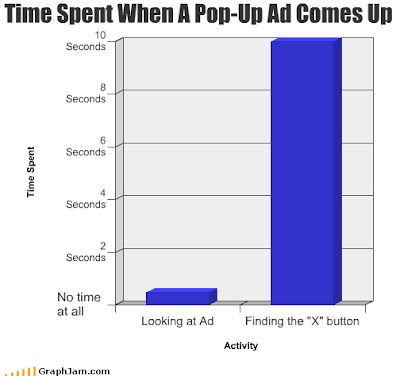"Punch the Monkey and Win" ads by Advertising.com were basically wide banner ads that you find on top of common search engines (Yahoo, Alta Vista, Lycos, Inktomi... hey do you even know what Inktomi was?). It even showed up on content providers like CNN, etc. The implementation of Punch the Monkey went through countless revisions (it could have been motion GIF or Java Applet and later Flash), but the idea was simple: on the ad, show a monkey that moves back and forth, and you use your mouse to click where the monkey is. When you "punch" the monkey at the right time, the ad brings you to another screen that says something like "CONGRATULATIONS YOU WON! Fill out this form to get free coupons and great deals and super discounts at a store of your choice near you!!!" Ok, I don't know why people out there actually fill out these spammy forms, but in the wonderful world of advertising, amazing innovations happen because of an abundance of idiots filling out these spammy forms.
This is just a sample to show you how annoying it is. It is not a real ad.
Ok fine, so Punch the Monkey is a sleazy ad, BUT IT WORKED and made lots and lots of money! It was so prevalent in those days, it was hard to not see a monkey ad during the day. Advertising.com did a lot of analysis on click-through-rates (CTR). Any sort of color or motion or sound caused more people to click, and that was good news for advertising companies that wanted to spam or just collect lead-gen. In fact, it worked so well, that after a while everyone knew what it was all about, and in time people stopped punching the monkey and that was uber bad news for Advertising.com. What did they do in response? They made the monkey ad MORE colorful. That increased CTR, and they were happy for a while...but then... people stopped clicking again. So then they made the monkey move FASTER, and CTR increased... but eventually... CTR went down again! So then they made the monkey more obnoxious by adding multiple monkeys, uglier monkeys, monkeys that popped out of your browser, so on so forth. This kept going and going for about a year and every time Advertising.com did something different, CTR went up a little. As you can imagine, the ads got very obnoxious, especially the unwanted pop-ups (Javascript became more prevalent). Eventually, people got really tired of the monkey and just said "F*** I HATE THIS MONKEY" and simply went to other sites that didn't have the monkey ad.
 Moral of the story? You can run your business on... pure business, and you can try to squeeze money from people, but if you provide something of no value to people (adding Punch the Monkey ad to something of value), it devaluates the product, the user experience, and turns people off. In the end, the product DOES matter regardless of how much monkey you make. People will eventually get turned off by your product and never come back again. I guess this is one of the countless reasons why I'm usually turned off by work that deals with advertising, and how people prioritize short term business gains over value and user experience. By the way, Advertising.com was bought by AOL, so I guess the executives were happy about their exit. Now, WHY would AOL buy something like that is beyond me, but I guess AOL isn't so different from Advertising.com where they are first and foremost, business driven (vs. Apple that is very much "quality experience" driven). I'm sure Steve Jobs would not have said anything kind about AOL and Advertising.com.
Moral of the story? You can run your business on... pure business, and you can try to squeeze money from people, but if you provide something of no value to people (adding Punch the Monkey ad to something of value), it devaluates the product, the user experience, and turns people off. In the end, the product DOES matter regardless of how much monkey you make. People will eventually get turned off by your product and never come back again. I guess this is one of the countless reasons why I'm usually turned off by work that deals with advertising, and how people prioritize short term business gains over value and user experience. By the way, Advertising.com was bought by AOL, so I guess the executives were happy about their exit. Now, WHY would AOL buy something like that is beyond me, but I guess AOL isn't so different from Advertising.com where they are first and foremost, business driven (vs. Apple that is very much "quality experience" driven). I'm sure Steve Jobs would not have said anything kind about AOL and Advertising.com.
No comments:
Post a Comment